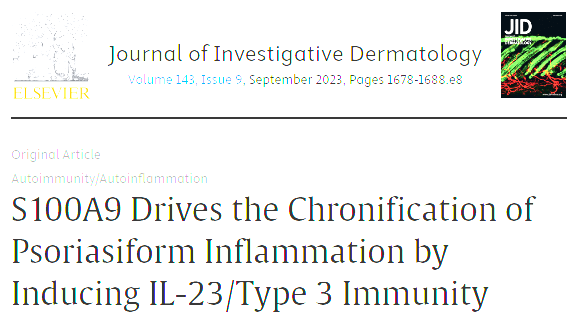S100A9 Drives the Chronification of Psoriasiform Inflammation by Inducing IL-23/Type 3 Immunity
Psoriasis is a chronic inflammatory skin disorder driven by the IL-23/type 3 immune response. However, molecular mechanisms sustaining the chronicity of inflammation and psoriatic lesions remain elusive. Combining systematic analyses of several transcriptomic datasets, we delineated gene signatures across human psoriatic skin, identifying S100A9 as one of the most up-regulated genes, which was confirmed in lesioned skin from patients with psoriasis and preclinical psoriasiform skin inflammation models. Genetic ablation or pharmacologic inhibition of S100A9 alleviated Aldara-induced skin inflammation. By single-cell mapping of human psoriatic skin and bone marrow chimeric mice experiments, we identified keratinocytes as the major source of S100A9. Mechanistically, S100A9 induced IL-23 production by dendritic cells, driving the IL-23/type 3 immunity in psoriasiform skin inflammation. In addition, the cutaneous IL-23/IL-17 axis induced epidermal S100A9 expression in human and experimental psoriasis. Thus, we showed an autoregulatory circuit between keratinocyte-derived S100A9 and IL-23/type 3 immunity during psoriasiform inflammation, identifying a crucial function of S100A9 in the chronification of psoriasis
Authors
Silva de Melo BM, Veras FP, Zwicky P, et al.
External link
Publication Year
Publication Journal
Associeted Project
Microbiology or Immunology
Lista de serviços
-
As antisense RNA gets intronic.As antisense RNA gets intronic.
-
Androgen responsive intronic non-coding RNAs.Androgen responsive intronic non-coding RNAs.
-
Conserved tissue expression signatures of intronic noncoding RNAs transcribed from human and mouse loci.Conserved tissue expression signatures of intronic noncoding RNAs transcribed from human and mouse loci.
-
The intronic long noncoding RNA ANRASSF1 recruits PRC2 to the RASSF1A promoter, reducing the expression of RASSF1A and increasing cell proliferation.The intronic long noncoding RNA ANRASSF1 recruits PRC2 to the RASSF1A promoter, reducing the expression of RASSF1A and increasing cell proliferation.
-
Antisense intronic non-coding RNA levels correlate to the degree of tumor differentiation in prostate cancer.Antisense intronic non-coding RNA levels correlate to the degree of tumor differentiation in prostate cancer.
-
Insight Into the Long Noncoding RNA and mRNA Coexpression Profile in the Human Blood Transcriptome Upon Leishmania infantum Infection.Insight Into the Long Noncoding RNA and mRNA Coexpression Profile in the Human Blood Transcriptome Upon Leishmania infantum Infection.
-
Long non-coding RNAs associated with infection and vaccine-induced immunityLong non-coding RNAs associated with infection and vaccine-induced immunity
-
Comparative transcriptomic analysis of long noncoding RNAs in Leishmania-infected human macrophagesComparative transcriptomic analysis of long noncoding RNAs in Leishmania-infected human macrophages
-
SARS-CoV-2 Selectively Induces the Expression of Unproductive Splicing Isoforms of Interferon, Class I MHC, and Splicing Machinery Genes.SARS-CoV-2 Selectively Induces the Expression of Unproductive Splicing Isoforms of Interferon, Class I MHC, and Splicing Machinery Genes.

